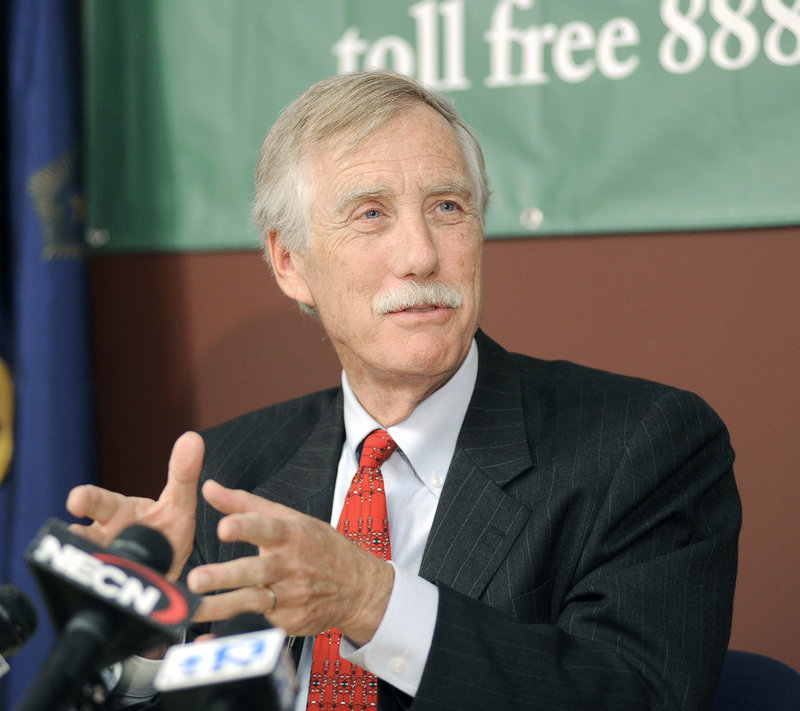If Internet service providers are allowed to speed up, slow down or block various Web-based services to serve their own interests, it will have a chilling effect on innovation, investment and startup activity in Maine and elsewhere, said a panel of experts including U.S. Sen. Angus King who spoke Friday in Portland.
The issue of equal treatment by Internet providers such as cable companies is known as “net neutrality.” It has become a topic of heated debate in recent months because the Federal Communications Commission is considering rule changes that would let Internet providers create a tiered environment in which web-based companies could pay a premium to obtain a speed advantage over their competitors.
Video content providers, such as Netflix, that compete with cable companies could even see their services blocked entirely, proponents of net neutrality say.
Dispensing with net neutrality could result in the “creation of fast and slow lanes on the Internet,” said panelist Craig Aaron, president and CEO of Free Press, and an advocate for media and Internet freedom. That would hurt small startups and give cable companies an unfair competitive advantage over content providers that do not own their own delivery infrastructure, he said.
In addition to Aaron and King, the panel included Avalon Ventures General Partner Brady Bohrman, a venture capitalist. The discussion was held on the last day of Maine Startup and Create Week, a weeklong event to prod discussions about innovation and was sponsored in part by Portland Press Herald’s parent company, MaineToday Media.
A tiered system in which companies pay extra to have their content delivered more quickly to consumers would create strong financial incentives for Internet providers to constrict speeds for those unwilling or unable to pay for preferential treatment, said Aaron.
“The only reason to have a fast lane is if everybody else is stuck in a traffic jam,” he said.
All three panelists at the event, held at the Portland Public Library, opposed the FCC’s proposal to place the issue of neutrality in the hands of the cable companies.
Without a federal regulator to turn to, web-based firms alleging unfair discrimination by cable companies would have little choice but to seek help from the courts, King said.
“We can’t have rules that rely for their enforcement on businesses to sue somebody,” he said. “They’ll kill you with lawyers.”
While he would support legislation to preserve net neutrality, King said that in the current environment of political gridlock, it’s unlikely Congress would be able to pass such a bill.
The decision will have to be made by FCC Chairman Tom Wheeler, a former lobbyist for the cable industry who also spent much of his career as an entrepreneur, the panelists said. They expressed hope that Wheeler ultimately would side with entrepreneurs over cable providers.
The proposed rules that critics say would dismantle net neutrality were released by the FCC in mid-May and are now subject to a public comment period, which ends July 15. Consumers who wish to express their opinions can do so on the FCC’s comment page, www.fcc.gov/comments.
King said Maine residents also should send letters voicing their opinions to elected officials.
Preserving net neutrality by federal regulation is a no-brainer, he said, and is jeopardized only because the large cable companies spend millions on lobbying.
“We really shouldn’t be having this debate,” he said. “It’s crazy.”
The panel did not include any cable company representatives, but King briefly described their argument, that the additional revenue is necessary to cover continued investment in high-speed Internet infrastructure.
The problem with eliminating net neutrality, from an investor’s standpoint, is that it does not guarantee startup companies a level playing field, Bohrman said.
Venture capitalists would be more reluctant to invest in innovative companies if they feared that future regulatory changes could turn an otherwise solid business model into a money-loser, he said.
Without net neutrality, “there would be no hope for a YouTube today,” Bohrman said. “I think this would have a real dampening effect on our innovation culture,” he said.
Some audience members asked whether the debate over net neutrality could affect Internet customers in Maine, particularly the 40,000 rural residents who don’t have access to broadband service.
King said it would not likely have an effect, and that other measures would have to be taken to better serve rural communities. He suggested that the build-out of rural broadband might be facilitated by local cooperatives, similar to those created in the early days of power utilities.
King said the absence of broadband service is “economic suicide” for communities, and he argued that Internet service has become a necessity, not a luxury.
Aaron said alternatives to high-speed cable Internet service do exist in many rural areas, but that they usually don’t offer the same level of speed and reliability.
“You want the Internet, if you live in a rural area, not the schminternet,” he said.
Copy the Story LinkSend questions/comments to the editors.




Success. Please wait for the page to reload. If the page does not reload within 5 seconds, please refresh the page.
Enter your email and password to access comments.
Hi, to comment on stories you must . This profile is in addition to your subscription and website login.
Already have a commenting profile? .
Invalid username/password.
Please check your email to confirm and complete your registration.
Only subscribers are eligible to post comments. Please subscribe or login first for digital access. Here’s why.
Use the form below to reset your password. When you've submitted your account email, we will send an email with a reset code.